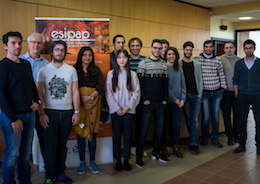
Detector specialists: the Next Generation
Bob Holland (ESI), 21/03/2018

Students and faculty from ESIPAP's second module on the technology and applications of particle and astroparticledetectors at ESI-Archapms (Image: ESI-Archamps)
Each year since 2014, the European School of Instrumentation in Particle & Astroparticle Physics (ESIPAP) has given highly motivated young physicists from all over Europe and beyond a unique opportunity to explore the field of particle detectors under the guidance of some fifty scientists and engineers, chosen amongst the best specialists in their fields. The latest school has just come to an end and applications open soon for the 2019 edition. ESIPAP includes lectures, tutorials and computer sessions held at ESI-Archamps near Geneva as well as visits and practical work at CERN and LPSC Grenoble. Professor Johann Collot, ESIPAP's director and long-standing member of the ATLAS collaboration, says: "This is the only place in the world where such a school can be organised at an acceptable cost."
ESIPAP follows in the footsteps of its elder sister, the Joint Universities Accelerator School (JUAS), which celebrated its 25th edition at ESI this year. Two month-long ESIPAP modules are held in Archamps from mid-January to mid-March. The first module takes a comprehensive look at the physics behind particle detectors, while the second is divided into four courses on Technologies & Electronics, Computing & Data Handling, Mechanics & Medical Applications and Offline Computing. Both modules are concluded by exams so that partner universities can attribute ECTS and/or doctoral credits to their participating students.
ESIPAP has become an exciting knowledge-driven start-up venture that attracts more and more partner universities every year. In an age of Massive Open Online Courses, ESIPAP believes in disseminating knowledge through face-to-face scientific mentoring. Silke Möbius, a Master student from the University of Göttingen studied at ESIPAP after a period spent as a summer student at CERN and concludes: "For everything you're interested in, there's an expert standing in front of you explaining it in detail."
Sixty-six Master and PhD students from 26 countries, 12 of which from outside Europe, have already attended ESIPAP over the years. Here ESIPAP is proud to act not only as a place of knowledge transfer and sharing, but also as a vector of peace and dialogue between peoples, irrespective of their language, culture, political institutions or religion. To quote Daniel Bultrini, who came to ESIPAP after completing his Master's degree at the University of Glasgow: "ESIPAP has shown me the passion which goes into large international projects and how they can be brought to completion."
The ESIPAP adventure has been made possible by a multi-annual grant attributed to ESI-Archamps by the French "research cluster of excellence" ENIGMASS, a federative structure comprising Grenoble-Alpes University and four CNRS/IN2P3 research facilities including LPSC Grenoble and LAPP Annecy.
